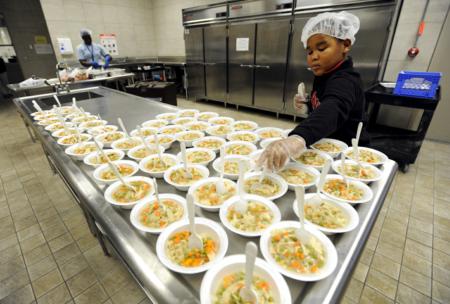Summer recess: Kids could go hungry if agencies don't fill gaps
WASHINGTON (CNS) -- A new report that more low-income children ate free breakfasts and lunches last summer than the previous summer is both good news and bad.
Of course, food program advocates emphasize that more children are getting fed, but they also point out the sheer numbers of those who need these meals and the sobering reality that so many children go hungry when their school cafeterias close for the summer months.
A positive note is that the word seems to be getting out more about subsidized food programs around the country and programs are also getting more creative in how to deliver these meals -- by trucks or buses -- to children who can't reach the food sites.
But there is still a lot to do to make sure children who eat free and reduced-price meals during the school year have access to food in the summer, said a report released in early June by the Washington-based Food Research and Advocacy Center.
The report notes that last July, the federally run Summer Nutrition Programs served nearly 3.2 million children -- an increase of 215,000, or about 7.3 percent, from the previous year.
It points out that participation in the summer meals program, which started in 1968, began dropping in July 2009 when states and communities cut back their child care and summer program funding. In 2012, this trend began to reverse with a slight increase that continued the next two years. But even with these increases, only one in six of the children who rely on subsidized school lunches during the year participate in the summer food programs, the report said.
This fall, Congress is set to reauthorize the Child Nutrition Act, which creates rules for school and summer meal programs. The Food Research and Advocacy Center said there are steps the law could take to make sure these summer food programs reach more children.
For starters, legislation could allow areas with 40 percent or more of students (instead of the current 50 percent) receiving free or reduced-price lunches to be eligible for the program.
The group also says the program should consider providing free dinners along with lunches and breakfasts and it should provide support for organizations to transport children to meal sites or to serve meals remotely through mobile units.
Anne Ayella, assistant director of Nutritional Development Services, an agency of the Archdiocese of Philadelphia that connects schools, parishes and groups with the U.S. Department of Agriculture's Summer Nutrition Programs, agreed that more should to be done to get meals to children in need.
She said the archdiocesan program has been coordinating summer meal programs since 1977 and currently delivers breakfasts, lunches and snacks to 450 sites which include camps and summer programs run by a number of different religious denominations. "We traditionally serve 1 million meals a summer" she said, noting that last year this number dipped to 909,000, "which is still an awful number," but she said it went down because there are so many more local sponsors of the summer food program.
The biggest change she has seen in doing this work for 36 years is that it's become harder to get the children to come to the food sites.
Ayella told Catholic News Service that she thinks parents are afraid to let their children go out and often tell them not to leave home during the day.
She has also seen meal sites struggle for the funds to stay open all summer or to run other programs where they'd need to pay counselors or buy games and crafts.
The archdiocesan program has a central warehouse where food is shipped daily and assembled by workers, often college students, into boxes. Lunches include a sandwich, fruit, vegetable and skim milk and breakfasts primarily contain a muffin, fruits and juice.
Ayella said this work has been rewarding, particularly since her job doesn't involve "worrying about food getting from point A to point B." She said she makes sure the overall plan is in motion, does taste tests, visits sites and organizes a yearly summer blessing at one of the sites.
She said she is always looking for more groups to offer meal sites, from trying to partner with libraries that have summer reading programs or offices that provide vouchers for the Women, Infants and Children nutrition program, or WIC.
Patricia Cole, communications director for Catholic Charities USA, said there has been a significant increase in the agencies running summer nutrition programs in recent years and several more agencies are opening sites for the first time this summer.



















